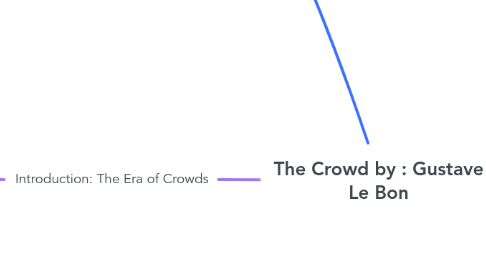The Crowd by : Gustave Le Bon
Jacob Wood M.B.A., M.Ed.により


1. Introduction: The Era of Crowds
1.1. "...a more attentive study of these events shows that behind their apparent causes the real cause is generally seen to be a profound modification in the ideas of peoples. The true historical upheavals are not those which astonish us by their grandeur and violence." Pg. 7
1.1.1. "The memorable events of history are the visible effects of the invisible changes of human thought." Pg. 7
1.2. "Two fundamental factors are at the base of this transformation. The first is teh destruction fo those religious, political, and social beliefs in which all the elements of our civilization are rooted. The second is teh creation of entirely new conditions of existence and thought as the result of modern scientific and industrial discoveries." Pg. 7
1.3. " Little adapted to reasoning, crowds, on the contrary, are quick to act. As the result of their present organization their strength has become immense. The dogmas whose birth we are witnessing will soon have the force of the old dogmas; that is to say, the tyrannical and sovereign force of being above discussion. The divine right of the masses is about to replace the divine right of the kings." Pg. 9
1.4. "Crowds are only powerful for destruction. Their rule is always tantamount to a barbarian phase." Pg. 10
1.4.1. "When the structure of a civilization is rotten, it is always the masses that bring about its downfall. Pg. 10
1.5. "Without a doubt criminal crowds exist, but virtuous and heroic crowds, and crowds of many other kinds, are also to be met with." Pg. 11
1.5.1. "The mental constitution of crowds is not to be learnt mearly by a study of their crimes, any more than that of an individual by a mere discription of his vices." Pg. 11
1.6. "It is only by obtaining some sort of insight into the psychology of crowds that it can be understood how slight is the action upon the of laws and institutions, hw powerless they are to hold any opinions other than those which are imposed upon them, and that it is not with rules based on theiries of pure equity that they are to be led, but by seeking what produces an inmpression on them and what seduces them." Pg. 11
1.7. "...but this economic proceeding involves an amount of forsight of which the masses are incapable." Pg. 12
1.8. "Experience has not taught them as yet to a sufficient degree that men never shape their conduct upon the teaching of pure reason." Pg. 12
2. Chapter One: General Characteristics of Crowds. -- Psychoogical Law of Their Mental Unity
2.1. "...a psychology crowd. It forms a single being, and is subjected to the Law of the Mental Unity of Crowds." Pg. 15
2.2. "...an entire nation, though there may be no visible agglomeration, may becom a crowd under the action of certain influences." Pg. 16
2.3. "... all mental constitutions contain possibilities of character which may be manifested in concequence of a sudden change of environment." Pg. 16
2.4. "In a crowd every sentiment and act is contagious, and contagious to such a degree that an individual readily sacrifices his personal interest to the collective interest. This is an aptitude very contrary to his nature, and of which a man is scarcely capable except when he makes part of a crowd." Pg. 20
2.5. "Moreover, by the ere fact that he forms part of an organized crowd, a man descends several rungs in the ladder of civilizations..." Pg. 21
2.5.1. "It is for these reasons that juries are seen to deliver verdicts of which each individual juror would disapprove..." Pg. 21
